The Rise of Cognitive Computing
After AlphaGo has made its name by defeating “Ke Jie”, the word champion of Go, the ancient Chinese strategy board game, in May 2017 [1], the world was crazy about the power of Artificial Intelligence (A.I.). Whilst A.I. is spreading to every aspect of our life, recent researches and insights are turning to emphasize on the importance of Cognitive Computing instead [2].

So what is Cognitive Computing and why is it important?
Human Cognition
Everything starts from Human Cognition. The literal meaning suggests that our biological and mental process of learning and understanding start with our senses and memory [3].
In details, Human Cognition is the processing of information:
- Perception of stimulus from our senses in the form of information signals within our nerves and brain,
- Combined with our Working/Long Term Memory to facilitate cognitive tasks, like communication with natural languages, calculation, logical reasoning, problem solving, judgment and etc.
Furthermore, Human Cognition can be classified into 3 levels, namely, “Cognition”, “Metacognition” and “Epistemic Cognition” from the lowest to the highest level. [5]
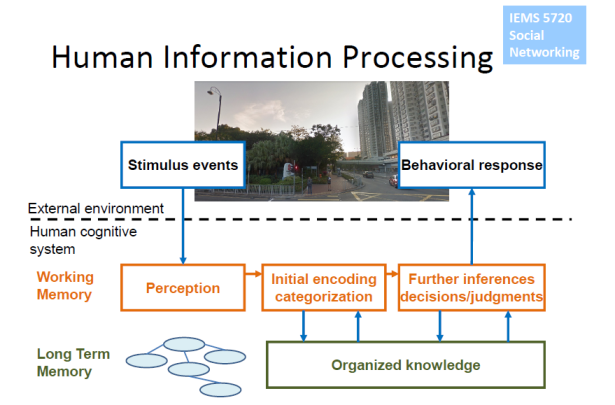
Cognitive Science
Later, “Cognitive Science” was founded by Christopher Longuet-Higgins in 1973 in his commentary in an A.I. research which presents a more organized and scientific understanding of the principles behind the whole Human Cognition process [6].
As you may be aware, human cognition is never a simple and easy process. The same applies to Cognitive Science, which is the interdisciplinary study of linguistics, neuroscience, artificial intelligence, philosophy, anthropology, and psychology. [7]
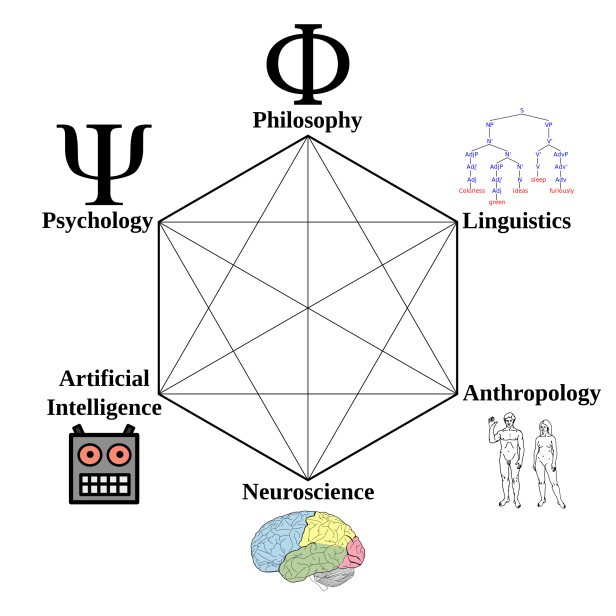
- Attention
- Linguistics/Natural Language Processing (NLP)
- Learning and Development
- Memory
- Perception and Action
- Consciousness
- Artificial intelligence
Key findings in Cognitive science can have significant impacts to our world. For instance, in the field of Economics, Cognitive science introduced the model of human perception on bias and risks, leading to the development of behavioral finance. With better understanding of the brain’s functions and deficits around cognition, Cognitive science has contributed to discover the root causes and reasoning of specific illnesses and dysfunctions.
Just as in the past, Cognitive science will continue to contribute to the development of A.I. in many different ways.
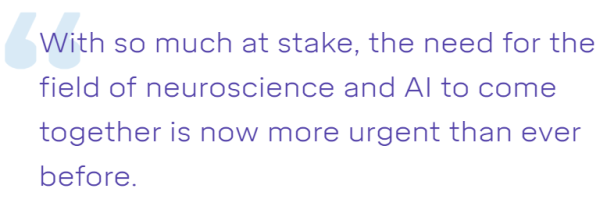
Demis Hassabis, the founder of DeepMind and the father of AlphaGo, highlighted the relationship between A.I. and Neuroscience (part of the Cognitive Science) in their articles published in Jul 2017 [8][9].

They believe that neuroscience has great positive impacts on A.I. researches for 2 reasons:
- Neuroscience supports the validation of the existing A.I. techniques. In short, if an artificial algorithm is found to be matching a neuro-function within our brain, it means that we should be on the right way.
- Neuroscience provides a wealthy source of inspiration for new algorithms and architectures. Historically, A.I. technologies are dominated by logic-based and mathematical models, so the classes of biological computation from neuroscience could be a significant accompaniment in the future.
What is Cognitive Computing?
Based on the theory of Cognitive Science, Cognitive Computing is the technology (hardware and software) that enables us to examine the functioning of human brains [10], and to improve the decision of human beings. It is designed to process data in a way that could accurately match the sensation, reasoning, learning and response model of our brain and mind.
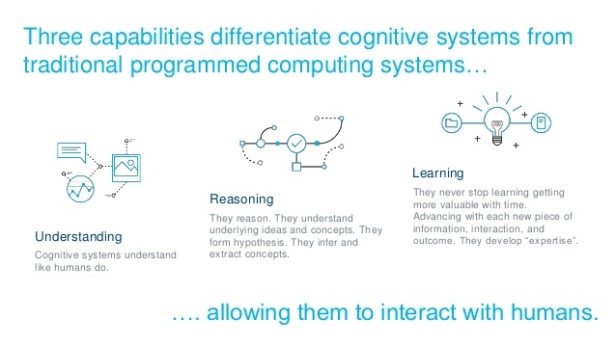
Features of cognitive systems include:
- Adaptive: Able to learn from information with evolving goals and requirements to resolve and predict the uncertainty involved.
- Interactive: Able to interact with users easily. Users can be applications, machines or people.
- Iterative and Stateful: Able to re-define vague or sketchy problems by asking questions or finding additional input. Having memory to remember previous interactions and able to return information that is responsible for a specific point in time.
- Contextual: Able to recognize, analyze, and extract contextual elements about people, places and things. Information can be structured and unstructured drawing from multiple sensory sources.
Nowadays, use cases of Cognitive Computing include Speech/Face/Image recognition, Sentiment/Behavioral analysis, Risk assessment, Fraud detection, etc.
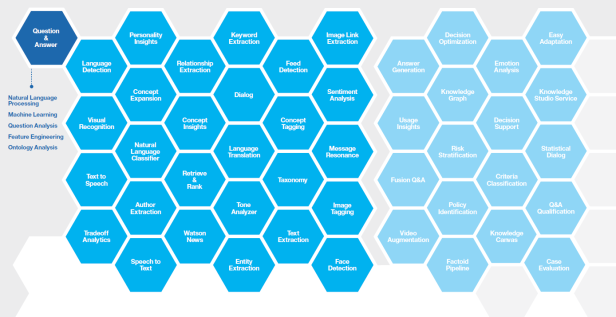
Cognitive Computing vs Artificial Intelligence
Till now, Cognitive Computing and A.I. are not yet clearly defined and widely agreed either by the academia or industry. However, the majority suggest the following when we apply them to the implementations and business value in real-life situations.

Machine Learning
Algorithms which allow machines to learn and act without being programmed explicitly [14].
Artificial Intelligence
A.I. systems give the best answer or decision of a complex problem based on the data provided. They are usually driven by powerful mathematics/computer algorithms. However, it does not have to consider any human factors, nor provides any reasoning in terms of human general understanding.
Cognitive Computing
Cognitive Computing Systems are designed to learn, to think, to memorize, and to interact with users in natural human ways in order to solve problems with human-understandable reasoning.
The Future of Humanity
Seeing the success of A.I. with its recent breakthroughs in different areas, some wonder whether A.I. will eventually replace our jobs [14] or destroy human (by Elon Musk [15], and Stephen Hawking [16]).
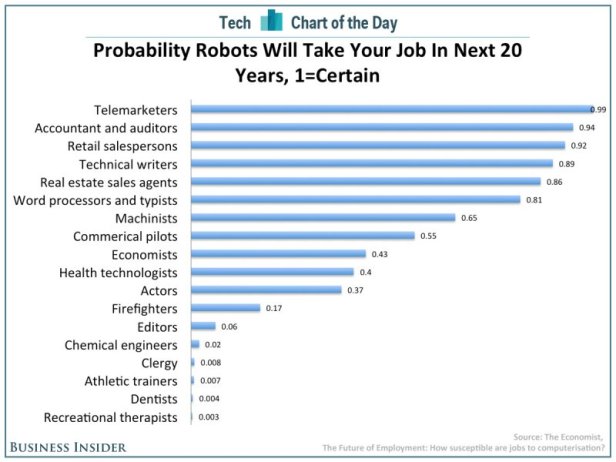
Compared to A.I., Cognitive Computing Systems will not replace human but will augment and supplement them. They do not give us the “right” answer, but they provide a summary of potential answers with hypotheses and explanations for our consideration.
Only with the deeper human involvement, could human enjoy the benefits of machine learning while being able to catch up with the burst of knowledge. Cognitive systems can be the partners for the growth of our professionals helping them to make the best decisions.
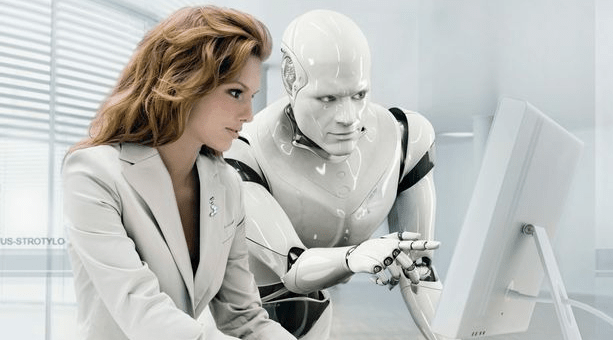
Technology is a double-sided sword – leading us to astonishing reward, and also striking disasters that humankind has ever seen before in just a second. In one sense, we are fortunate to have more opportunities to renovate the world than any generation ever, in another sense, we come across with more responsibility as we need to be careful of our choices. I believe Cognitive Computing will be the key of the humanity future.

“The much-hyped drama of ‘man vs. machine’ is a distraction… and it rests on an exciting but misguided fiction. Cognitive systems are not our competitor, nor will they become so. Neither the science nor the economics support such fears. Cognitive systems, as they actually exist, are a tool to deepen the relationship that really matters — the relationship between humans and the world… It’s true that cognitive systems are machines that are inspired by the human brain. But it’s also true that these machines will inspire the human brain, increase our capacity for reason and rewire the ways in which we learn.”
John E Kelly, SVP of IBM Research [17]
Reference
[1] The New York Times (May 2017). “Google’s AlphaGo Defeats Chinese Go Master in Win for A.I.”
https://www.nytimes.com/2017/05/23/business/google-deepmind-alphago-go-champion-defeat.html
[2] BBC. “The rise of cognitive computing”
http://www.bbc.com/storyworks/future/an-intelligent-future/the-rise-of-cognitive-computing
[3] Oxford Dictionaries. “Cognition”
https://en.oxforddictionaries.com/definition/cognition
[4] Rosanna Chan, CUHK. “IEMS5720 – Social Networking”
http://www.ie.cuhk.edu.hk/msc/course_software_applications
[5] Kitchner K.S. (1983). “Cognition, Metacognition, and Epistemic Cognition”
https://www.karger.com/Article/Abstract/272885
[6] Longuet-Higgins, H. C. (1973). “Comments on the Lighthill Report and the Sutherland Reply”, in Artificial Intelligence: a paper symposium, Science Research Council, 35-37
http://www.math.snu.ac.kr/~hichoi/infomath/Articles/Lighthill%20Report.pdf
[7] Miller, George A (2003). “The cognitive revolution: a historical perspective”
http://www.cs.princeton.edu/~rit/geo/Miller.pdf
[8] Demis Hassabis, Christopher Summerfield, Matt Botvinick (Aug 2017). “AI and Neuroscience: A virtuous circle”, DeepMind
https://deepmind.com/blog/ai-and-neuroscience-virtuous-circle/
[9] Demis Hassabis, Christopher Summerfield, Matt Botvinick (Jul 2017). “Neuroscience-Inspired Artificial Intelligence”, Neuron, Volume 95, Issue 2, p245–258
http://www.cell.com/neuron/abstract/S0896-6273(17)30509-3
[10] Knight Shawn (Aug 2011). “IBM unveils cognitive computing chips that mimic human brain”, TechSpot
https://www.techspot.com/news/45138-ibm-unveils-cognitive-computing-chips-that-mimic-human-brain.html
[11] Daniela Zuppini, IBM (May 2017). “Building a Cognitive Business”
https://www.slideshare.net/DanielaZuppini/ibm-cognitive-platform-ibm-watson
[12] Jouko Poutanen, IBM (Nov 2016). “IBM Watson”
https://www.slideshare.net/JoukoPoutanen/ibm-watson-cognitive-robots
[13] Peter Sommer, IBM (Nov, 2017). “Artificial Intelligence, Machine Learning and Cognitive Computing”
https://www.ibm.com/blogs/nordic-msp/artificial-intelligence-machine-learning-cognitive-computing/
[14] The Economist (Jan, 2014). “The Future Of Jobs: The Onrushing Wave”
http://www.businessinsider.com/the-future-of-jobs-the-onrushing-wave-2014-1
[15] Aatif Sulleyman, The Independent (Nov, 2017). “AI is highly likely to destroy humans, Elon Musk warns”
http://www.independent.co.uk/life-style/gadgets-and-tech/news/elon-musk-artificial-intelligence-openai-neuralink-ai-warning-a8074821.html
[16] Rory Cellan-Jones, BBC (Dec, 2014). “Stephen Hawking warns artificial intelligence could end mankind”
http://www.bbc.com/news/technology-30290540
[17] John E. Kelly III, IBM (Oct 2015). “Computing, cognition and the future of knowing”
https://www.research.ibm.com/software/IBMResearch/multimedia/Computing_Cognition_WhitePaper.pdf

Unlike other posts I have ever read, your post sets the human cognitive as the starting point, and gives us so many things outside the classroom. The sequence you telling the story is human cognitive, cognitive science, cognitive computing and the relationship between humans and machine, which starts at the theory, applies the theory to the techniques, and ends up in the degree of philosophy , thus illustrating your creative logical thinking and broad scope of knowledge. I guess if you add more details on it, and it will become a wonderful interdisciplinary academic essay!
LikeLike
This post is great, you give us a detailed introduction on the cognitive computing and A.I. I also watched the Go match between Ka Jie and AlphaGo. It is really sad to watch the boy crying under the pressure of a mighty opponent. However, as the other Go players suggested, AlphaGo did a great job in promoting this traditional game. It also provides a lot of new strategies in playing this game which is full of wisdom.
In this new era, human have to learn how to adapt to new technologies. A.I. can free us from some boring jobs and providing enough resources supply, this can greatly increase our time to do what we wanna do. However, someone’s dream career maybe taken by A.I., It is still a long way to figure out A.I.’s role in human development.
With great power comes great responsibility – Uncle Ben in Spiderman
So, here it comes, everyone can use new technology to get stronger in everything. Choices would mean much more in the future. It is our responsibility to think how we can use this sword – To kill or to protect. Thanks for sharing what we really should care in this rapid development.
LikeLike
This is a great article – so clear and easy to follow. You gives us an interesting introduction which recall my memory about AlphaGo.
I agree what you have mentioned “Everything starts from Human Cognition.” because we learn anything start with our sense.And, the processes of Human Cognition can analyzed from different perspectives within different contexts.
It is true that cognitive computing and artificial intelligence are not clearly defined nowadays. In my view ,cognitive computing and artificial intelligence represent the next big wave in supercomputing. AI and cognitive computing systems are based on the ability of machines to sense, reason, act and adapt based on learned experience.
Therefore, I think AI and cognitive computing will relieve us of a wide range of tasks, such as cooking and mining.
However, i am not sure whether cognitive computing cannot gives us the right answer. Can you explain more?
LikeLike